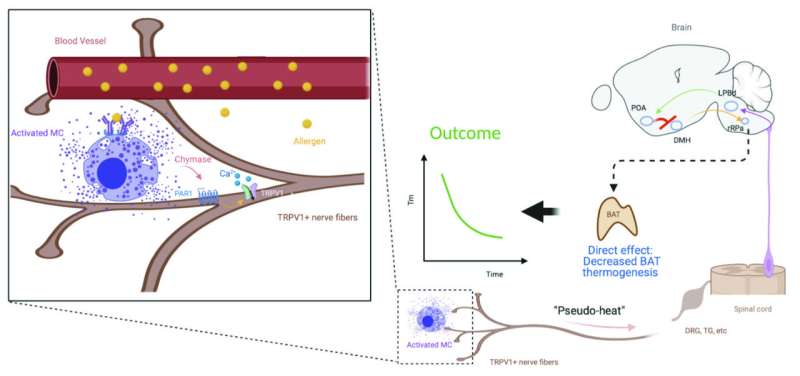This article has been reviewed according to Science X's editorial process and policies. Editors have highlighted the following attributes while ensuring the content's credibility:
fact-checked
peer-reviewed publication
trusted source
proofread
Study identifies key role for nervous system in severe allergic shock

A key feature of the severe allergic reaction known as anaphylaxis is an abrupt drop in blood pressure and body temperature, causing people to faint and, if untreated, potentially die.
That response has long been attributed to a sudden dilation and leakage of blood vessels. But in a study using mice, Duke Health researchers have found that this response, especially body temperature drop, requires an additional mechanism—the nervous system.
Appearing online March 17 in the journal Science Immunology, the study could point to new targets for therapies to prevent or treat anaphylactic shock, which occurs in up to 5% of people in the U.S. annually in response to food allergies or bites from insects or venomous animals.
"This finding for the first time identifies the nervous system as a key player in the anaphylactic response," said senior author Soman Abraham, Ph.D., professor in the departments of Pathology, Immunology, and Molecular Genetics and Microbiology at Duke University School of Medicine.
"The sensory nerves involved in thermal regulation—especially the nerves that sense high environmental temperatures—send the brain a false signal during anaphylaxis that the body is exposed to high temperatures even though it is not the case," Abraham said. "This causes a rapid drop in body temperature as well as blood pressure."
Abraham and colleagues, including first author Chunjing "Evangeline" Bao, a Ph.D. candidate in Abraham's lab at Duke, tracked the sequence of events when allergens activate mast cells—the immune cells that trigger the chemical reactions leading to swelling, difficulty breathing, itchiness, low blood pressure and hypothermia.
The researchers found that one of the chemicals mast cells unleash when they are activated is an enzyme that interacts with sensory neurons, notably those involved in the body's thermoregulatory neural network.
When stimulated as part of an allergic reaction, this neural network gets the signal to immediately shut down the body's heat generators in the brown fat tissue, causing hypothermia. The activation of this network also causes a sudden drop in blood pressure.
The researchers validated their findings by showing that depriving mice of the specific mast cell enzyme protected them against hypothermia, whereas directly activating the heat sensing neurons in mice induced anaphylactic reactions such as hypothermia and hypotension.
"By demonstrating that the nervous system is a key player—not just the immune cells—we now have potential targets for prevention or therapy," Bao said. "This finding could also be important for other conditions, including septic shock, and we are undertaking those studies."
More information: Chunjing Bao et al, A mast cell–thermoregulatory neuron circuit axis regulates hypothermia in anaphylaxis, Science Immunology (2023). DOI: 10.1126/sciimmunol.adc9417. www.science.org/doi/10.1126/sciimmunol.adc9417



















